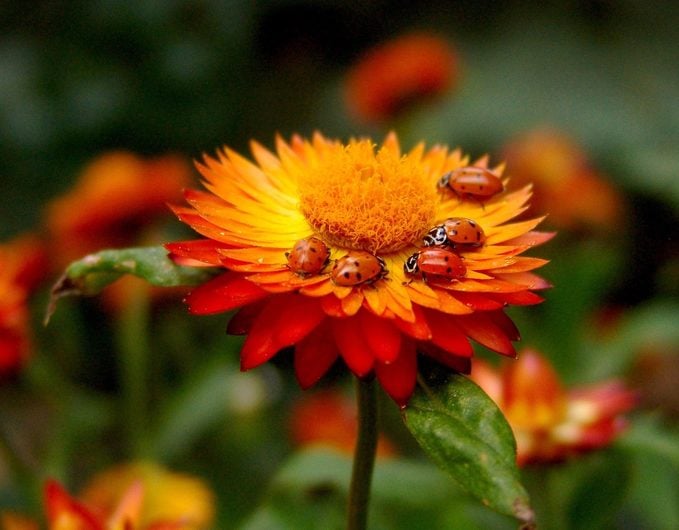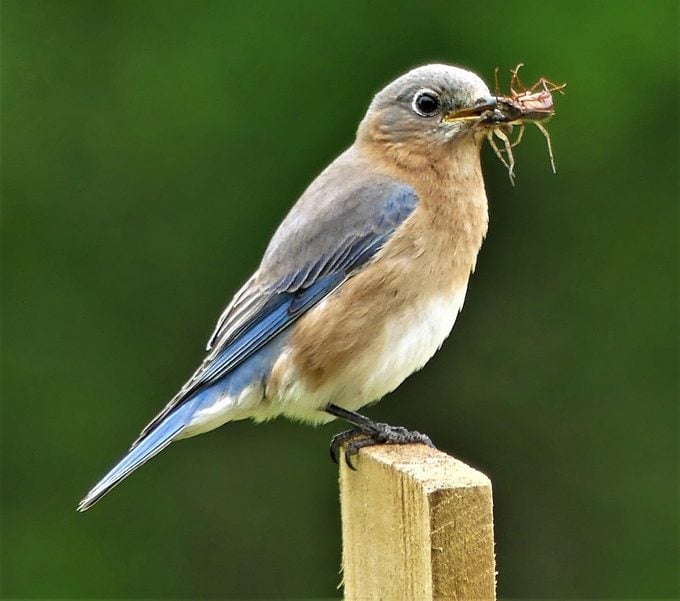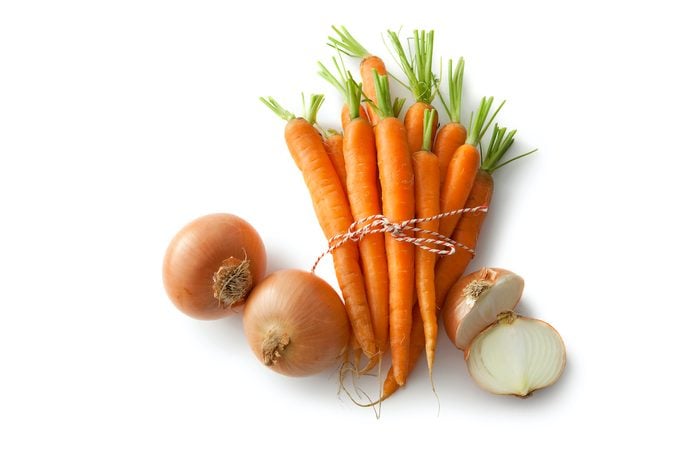10 Natural Ways to Keep Bugs out of Your Garden
Updated: Mar. 28, 2023
Looking for ways to eliminate garden insect pests, without resorting to pesticides? Get our tips for controlling harmful garden bugs, no chemicals required.
Our editors and experts handpick every product we feature. We may earn a commission from your purchases.

There’s no greater joy for a gardener than a plot full of perfect-looking flowers or vegetables. The problem is that many garden bugs use our flower and vegetable beds as a salad bar. But instead of looking to pesticides for help, you can still have a beautiful garden just by following these simple, natural and cost-effective tips for dealing with garden insect pests.
Start with “Clean” Soil
Good soil can actually deter garden insect pests. But it takes time to prepare. Here’s a method that works great:
- First till in organic matter like compost when the growing season begins. This will keep your soil clean by adding natural elements and compounds that help keep pests away.
- After tilling, cover your garden with black plastic or cardboard for 6 months. The heat that builds up underneath it will kill most garden pests and their eggs, weeds, parasites and a host of other harmful microorganisms.
- After removing the plastic, lightly cultivate the soil. Now you’re ready for planting.
Buy Disease and Pest-Resistant Seeds
It’s easier to prevent diseases and pests than it is to get rid of them after they arrive in your garden. When you look at seeds in a catalog, look for letters like V, F, N or T after the name of a seed; they indicate the problems to which the seed is most resistant. V and F stand for verticillium and fusarium, respectively-two diseases that affect tomatoes; N is for nematodes; and T is for tobacco mosaic virus, which causes leaves to wilt and yellow and damages the plant’s roots.
We found mosquito-repelling plants you need in your backyard ASAP.
Selectively and Aggressively Thin Out Plants
This is essential because small, weak seedlings are more likely to become diseased. And they, in turn, may pass the problem on to healthy plants. So be sure to prune away dead shoots and branches that restrict airflow. Plants need good air circulation to breath and stay healthy. Learn how and when to thin vegetable seedlings.
Water Plants in the Early Morning
Why? Well, plants primarily need water to help with photosynthesis, which occurs during the day. Also, if you water later in the day, the leaves will be damp during the cooler nighttime—an ideal condition for promoting fungus and other diseases. When you do water, soak the roots rather than getting the foliage wet. Soaker or drip hoses are a good investment. Follow these tips to conserve water in the garden.
Control Weeds
Weeds compete with your plants for valuable resources such as water, nutrients and light. And they often harbor garden insect pests and parasites, too. Be sure to pull weeds and their roots completely out of the ground.
Grow nasturtium flowers to keep bad bugs away.
Keep Your Garden Clean
Removing faded blooms, fallen leaves and weeds is important because decaying plant matter is a prime breeding ground for fungus, garden bugs and diseases. Carry a small pail or bucket with you every time you enter your garden and use it to collect garden litter.
Here’s how to get rid of powdery mildew.
Use Insect Traps
Yellow “sticky” cards are available at most garden centers. When placed on the ground and in between the shoots or branches of plants, they’ll catch many garden bugs that are traveling through your garden. Contact your local garden center or county extension agent for help in identifying the good garden bugs versus the bad ones.
Find out how to control and get rid of grasshoppers.
Add Beneficial Insects

Insects like ladybugs can be invaluable in the fight against garden insect pests. They eat aphids, mites and the eggs and larvae of many destructive insects. Other beneficial garden bugs include praying mantises, lacewings and parasitic wasps. Most beneficial insects can be purchased from large horticultural supply companies. Your county extension agent can help determine the quantity you’ll need for your garden. One important thing—don’t use any chemicals for 10 days before releasing these insects.
Psst—discover 8 bugs you should never kill in your garden.
Practice Crop Rotation
If you grow the same crop in the same place each year, the specific garden bugs that attack that crop will remain in the area, waiting for the next spring planting. Rotating crops also helps keep vital soil nutrients from being depleted. For instance, plant legumes (which put nitrogen into the soil) where you last planted tomatoes, corn or squash (which deplete nitrogen in the soil).
Pinch Off Dead or Infested Leaves
When you first see signs of diseased leaves, pluck them off. This will stop them from contaminating the entire plant.
Stop the tomato hornworm from damaging your tomatoes.
More Ways to Keep Bugs Out of Your Garden

“We put a bluebird house at the edge of our garden, and the birds manage the bugs for me. The plants lure the bugs, which are an easy meal for the bluebirds,” says Birds & Blooms reader Monica Partington of Raleigh, North Carolina.
“I grow mostly native trees, shrubs and perennials, and now the plants play host to certain insects that attract a variety of birds. It’s a win-win that requires no management from me,” says Birds & Blooms reader Sarah Miller of Avondale Estates, Georgia.
“To control ants, I sprinkle cinnamon along their trails and on their hills,” says Birds & Blooms field editor Jennifer Broadstreet Hess of Marion, Kansas.
“Japanese beetles invade our garden every spring. I put a squirt of lemon Ajax dish soap and a cup of water in a pot, then knock the beetles into the pot,” says Birds & Blooms reader Martha Russell of Carmel, Maine. Discover more tips for managing Japanese beetles.

“I’m a big fan of companion planting. One of my favorite combinations is alternating rows of carrots and onions. Together, they keep carrot flies and onion maggots away,” says Birds & Blooms field editor Sue Gronholz of Beaver Dam, Wisconsin.
“To keep slugs from eating tender young foliage, use horticultural-grade diatomaceous earth sprinkled around plants. Fresh herbs such as lemon balm also keep bad bugs away,” says Birds & Blooms field editor Kathy Eppers of Aledo, Texas.
Next, learn how to keep squash bugs out of your garden.
